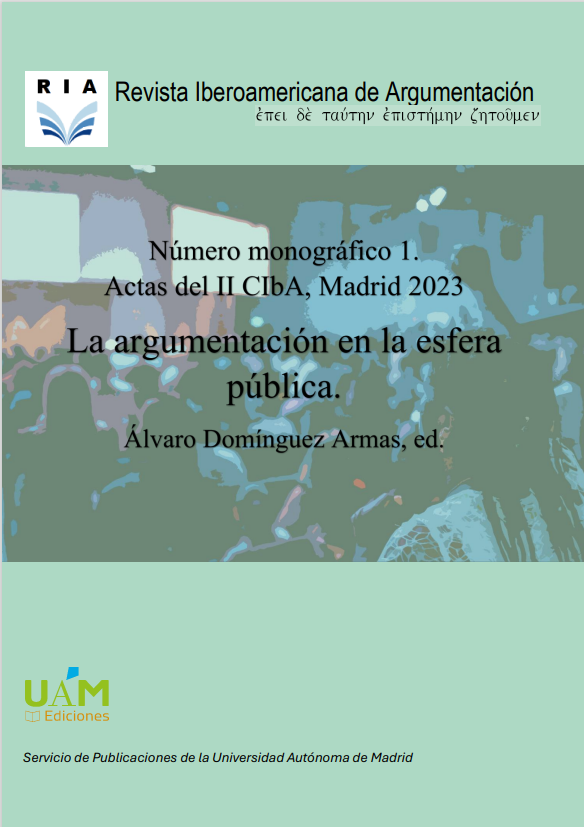Keywords:
credibility, epistemic authority, argumentative injustice, women arguers, identity prejudices, privilegeCopyright (c) 2024 Revista Iberoamericana de Argumentación

This work is licensed under a Creative Commons Attribution-NonCommercial-NoDerivatives 4.0 International License.
Abstract
This paper defends the thesis that women suffer from argumentative injustice and critically examines two ideas that prevent women's arguments from being properly evaluated: 1. The idealization of abstract ways of understanding the nature of arguments that disregard the social identities of the arguers. 2. The thesis that women's arguments contain elements that degrade their quality. Finally, it is concluded that argumentation, as a social practice, is influenced by power relations that cannot be ignored when examining arguments. Furthermore, it is likely that criticisms of the ways in which women argue stem from the fact that they are women, rather than inherent features of their arguments.
Downloads
References
Al Tamini, K. y Fields, J. (2011). “A gendered analysis of the role of authority in argumentation”, En OSSA Conference Archive 5. https://scholar.uwindsor.ca/ossaarchive/OSSA9/papersandcommentaries/5
Aresti Esteban, N. (2012). “Los argumentos de la exclusión. Mujeres y liberalismo en la España Contemporánea”, Historia constitucional: Revista Electrónica de Historia Constitucional 13, 407-432.
Bondy, P. (2010). “Argumentative Injustice”, Informal Logic 30/3, 263-268
Campbell, S. (1994). “Being Dimissed: The Politics of Emotional Expression” Hypatia 9/3, 46-65.
Carabajal, M. (2023, 25 de marzo). La mujer que marchó el 8 M y terminó asesinada. https://www.pagina12.com.ar/534786-la-mujer-que-marcho-el-8-m-y-termino-asesinada
Döring, S. (2010). “Why Be Emotional?”. En Peter Goldie (Ed). The Oxford Handbook of Philosophy of Emotion (pp. 282-301, cap.12). New York: Oxford University Press.
Fricker, M. (2017) [2007]. Injusticia epistémica. El poder y la ética del conocimiento (Ricardo García Pérez, Trad.). Barcelona: Herder.
Gilbert, M. (1997). “Prolegomenon to a Pragmatics of Emotion”. En OSSA Conference Archive. 38. https://scholar.uwindsor.ca/ossaarchive/OSSA2/papersandcommentaries/38
Hample, D. (2005). Arguing: Exchanging Reasons Face-to-Face. Mahwah, New Jersey: Lawrence Erlbaum Associates, Publishers.
Howes, M. y Hundleby, C. (2018). “The Epistemology of Anger in Argumentation”, Symposion 5/ 2, 229-254. https://scholar.uwindsor.ca/cgi/viewcontent.cgi?article=1885&context=ossaarchive
Iglesias, A. (2021, 26 de junio). Las locas con las que no se puede razonar, y encima van de víctimas. https://elasombrario.publico.es/locas-se-puede-razonar-encima-van-de-victimas/
Janack, M. (1997). “Standpoint Epistemology Without rhe “Standpoint”? An examination of Epistemic Privilege and Epistemic Authority”. Hypatia, 12/2, 125-139.
Linker, M. (2011). “Do Squirrels Eat Hamburgers?: Intellectual Empathy as a Remedy for Residual Prejudice”. Informal Logic, 31/2, 110–138.
McIntosh, P. (s, f.). “White Privilege and Male Privilege: A Personal Account of Coming to See Correspondences through Work in Women’s Studies (1988)”. https://www.collegeart.org/pdf/diversity/white-privilege-and-male-privilege.pdf
Moons, W. y Mackie, D. (2007). “Thinking Straight While Seeing Red: The Influence of Anger on Information Processing”. Personality and Social Psychology Bulletin 33/5, 706-720.
Perelman, C. y Olbrechts-Tyteca, L. (1994) [1989]. Tratado de la argumentación. La nueva retórica (Julio Sevilla Muñoz, Trad.). Madrid: Gredos.
Rooney, P. (2012). “When Philosophical Argumentation Impedes Progress”. Journal of Social Philosophy 43/3, 317–333.
Spender, D. (1985). Man Made Language. London: Routledge & Kegan Paul.
van Eemeren, F. y Grootendorst, R. (2003). A Systematic Theory of Argumentation: The pragma-dialectical approach. Cambridge: Cambridge University Press.
Tindale, C. (1999). Acts of Arguing. A Rethorical Model of Argument. New York: State University Press.
Toulmin, S. (1958). The Uses of Argument. Cambridge: Cambridge University Press.
Universidad de Valencia. (s. f.). Discurso de Clara Campoamor en las Cortes el 1 de octubre de 1931. http://pages.uv.es/formargenero/cas/otros_recursos/clara_campoamor.pdf
Walton, D. (2009). “Argumentation Theory: A Very Short Introduction”. https://www.researchgate.net/publication/226106124_Argumentation_Theory_A_Very_Short_Introduction
